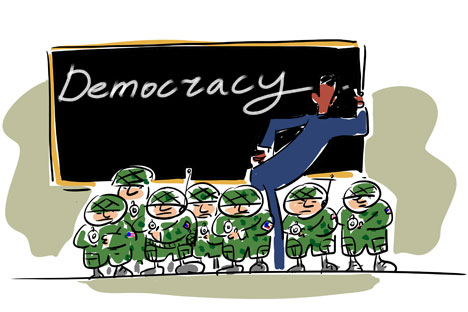The dangers of American exceptionalism

Drawing by Alexei Iorsh. Click to enlarge the image
One portion of Russian President Vladimir Putin’s recent opinion-piece in the New York Times on Syria that raised much stir in intellectual circles was the concluding part regarding American exceptionalism, where he wrote: “It is extremely dangerous to encourage people to see themselves as exceptional, whatever the motivation. There are big countries and small countries, rich and poor, those with long democratic traditions and those still finding their way to democracy. Their policies differ, too. We are all different, but when we ask for the Lord’s blessings, we must not forget that God created us equal.”
Putin, however, did not explicitly question America’s credentials to claim exceptionalism, and that is actually the core issue. Take income inequality, for instance. In a recent CNNMoney panel on inequality, the former U.S. labor secretary and Berkeley professor, Robert Reich, made the shocking statement that the 400 richest people in the U.S. have more wealth than the bottom 150 million combined.
This is not only about income inequality; it is also about lifespan inequality, education inequality. And the templates of inequality multiply rapidly when it comes to race relations in America. The fact remains that racial prejudice is rampant in American society.
America’s self-esteem of being exceptional does not hold up to scrutiny. Homicide takes place in America at an average of 87 times per day. America holds, by far, the world record in the number of wars fought and acts of aggression committed. It is the only country that has used nuclear weapons. All this would make America “exceptional” only in the most negative sense.
Look at the consequences that have followed in the wake of policies pursued out of notions of exceptionalism. Much of the world believes that the U.S. indulges in hypocrisy when it speaks of exceptionalism, and this has lowered America’s prestige all over the world.
Washington speaks of the application of “values” only selectively: There is one yardstick for Iran and another for Saudi Arabia; one response to Bahrain but a contrary response to Syria; an exacting standard for Gaza but seamless latitude for Israel’s acts of violence. And yet these are entities in the same region.
U.S. policies are increasingly compelling small countries with a heightened sense of vulnerability to devise strategic deterrents to ward off potential U.S. aggression, which, in turn, negatively impacts the global security architecture.
Related:
Putin: Obama's conviction that U.S. nation is exceptional is dangerous
Meanwhile, the notion of exceptionalism has prompted the U.S. to act outside international law and the U.N. Charter. This sets dangerous precedents and weakens the international organization, which, despite its flaws, still remains the only available forum for fostering peace and development.
The doctrine of American exceptionalism was badly exposed in Afghanistan and Iraq, where the prescriptive approach of the U.S. failed to impress the native populations rooted in their history, tradition and culture.
Ironically, the measure of success for the U.S. interventions in these two countries has finally come to be seen today in terms of the efficacy with which the U.S. is able to extricate its forces from the war zone without disarray and confusion. It is doubtful if these two countries will ever become genuine practitioners of democracy by American standards.
President Barack Obama’s claim that American ideals and principles make the country “different” and “exceptional” is a dangerous doctrine. It echoes an equally evocative doctrine that was expounded some eight decades ago in Europe with disastrous consequences.
The belief in oneself as “exceptional” is always fraught with the danger of prompting oneself to excessive actions. Guantanamo Bay and Abu Ghraib are living memories of horrible crimes committed by the U.S. downstream of actions undertaken on the pretext of exceptionalism.
The U.S. military interventions in sovereign countries have very often ended up exacerbating already complicated situations — Haiti, Liberia, Somalia, Afghanistan and Iraq are examples. This is what makes the Syrian problem an issue of exceptional importance.
Arguably, American exceptionalism paved the way for the tragic civil war in Syria. Thanks to the timely Russian diplomatic initiative, another direct military intervention by the Obama administration in the name of exceptionalism was stopped in its track.
Now, a way needs to be found for Syria to regain its identity as an exceptionally secular, pluralistic society, where many religions and ethnic identities once coexisted peacefully.
M. K. Bhadrakumar is a former Indian diplomat, a commentator and an analyst on international affairs — especially on developments in Russia, Central Asia, China, Afghanistan, Pakistan, Iran and the Middle East. He is a regular columnist for The Asia Times Online, Strategic Culture Foundation [Moscow], The Hindu and Deccan Herald, and Rediff.com.
All rights reserved by Rossiyskaya Gazeta.
Subscribe
to our newsletter!
Get the week's best stories straight to your inbox


